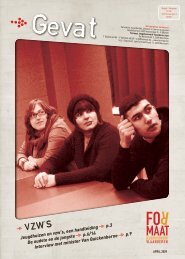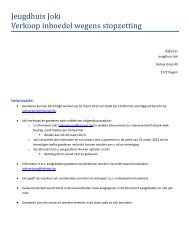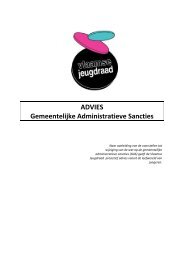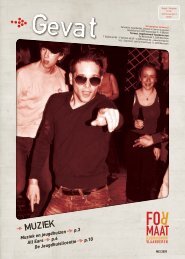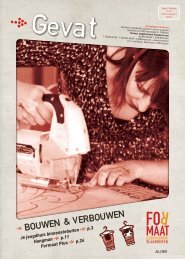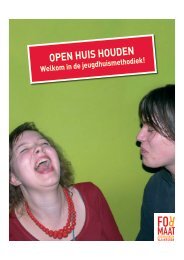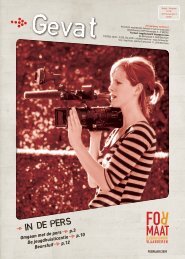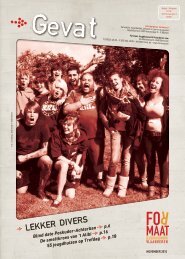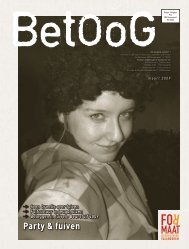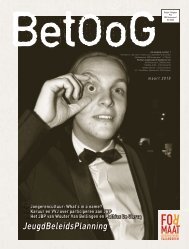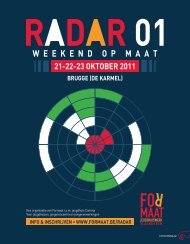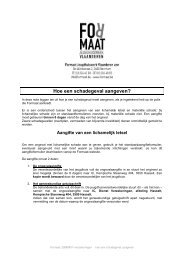YOUTH WORK CHALLENGED - Rolo - Formaat
YOUTH WORK CHALLENGED - Rolo - Formaat
YOUTH WORK CHALLENGED - Rolo - Formaat
- No tags were found...
You also want an ePaper? Increase the reach of your titles
YUMPU automatically turns print PDFs into web optimized ePapers that Google loves.
<strong>YOUTH</strong> <strong>WORK</strong> <strong>CHALLENGED</strong>On the road to the recognition of young people’s learning ininformal and non-formal settingsSituating the discussion paperThis is meant as a discussion paper for the ROLO (recognition of learningoutcomes in youth work) conference on Friday, May 30, 2008. In order toinvite the guest speakers and participants to debate and exchange ideas andthoughts, the paper includes some challenging statements and controversialprinciples. So by no means is this a consensus with shared opinions of theconference organisers and partner organisations, merely a starting point forthe debate.In this way, this conference discussion paper helps to realise one of the maingoals of the ROLO-conference: each participant of the conference (individualvisitors as well as organisations) is offered the opportunity to help shape theEuropean debate on the recognition of non-formal learning in youth work.The ROLO-conference is an initiative of <strong>Formaat</strong> Jeugdhuiswerk Vlaanderen(Flemish federation of Youth Clubs), ECYC (European Confederation ofYouth Clubs) and the city of Antwerp in cooperation with the VlaamseJeugdraad (The Flemish Youth Council), Steunpunt Jeugd (Youth SupportCentre), JES vzw and the European Youth Forum (YFJ, Youth ForumJeunesse).
BackgroundIn 2006, the Council of the European Union, gave, in their resolution on therecognition of the value of non-formal and informal learning, a ruling on thevaluable application and expertise of youth work: 1‘The value and visibility of non-formal and informal learning for young peopleshould be enhanced by recognising the work and achievements of youngpeople and those active in youth work and youth organisations. They shouldtherefore be given due consideration by employers, formal education and civilsociety in general.These kinds of learning are important because they:• are complementary to the formal education and training system;• have a participative and learner-centred approach;• are carried out on a voluntary basis and are therefore closely linked toyoung people's needs, aspirations and interests. By providing anadditional source of learning and a possible route into formal educationand training, such activities are particularly relevant to young peoplewith fewer opportunities;• take place in a wide and varied range of settings.The field of youth is important because of the economic and social impact ofpublic and private investment in this field at local, regional, national andEuropean levels. Non-formal and informal learning activities can thereforeprovide significant added value for society, the economy and young peoplethemselves.Non-formal and informal learning are important elements in the learningprocess and are effective instruments for making learning attractive,developing lifelong learning and promoting the social integration of youngpeople. They encourage the participation, active citizenship and socialinclusion of young people, and are of practical relevance to the labour marketby helping to acquire knowledge, qualifications and other key skills. ‘1See Official Journal of the European Union C168 (2006) “Resolution of the Council and of the Representatives of theGovernments of the Member States, meeting within the Council, on the recognition of the value of non-formal and informallearning within the European youth field”
These directives fit in the Lisbon strategy 2 , that aspires to develop the EU intothe most dynamic and competitive knowledge-based economy in the world by2010. The resolution quoted proves that Europe consequently continues onthe right track. At the same time, Europe recognizes youth work as a seriousand reliable stakeholder in the development of one’s competences, as thisshould not exclusively belong to the employment and formal educationsectors. The successive European recommendations point the way:appreciation and recognition of learning in the youth sector 3 . So, the horizon isbroadened the horizons to include not only workforce development but alsosocial inclusion and citizenship.With the increasing intensity of the debate around non-formal learning, youthwork is pushed more and more to say where it stands, which is verychallenging for a lot of youth workers and policymakers. For most of them, thisis not an easy exercise, because they feel that the ‘soft’ values of the ‘small’youth work are suddenly measured up to the norms of the ‘hard’ employmentsector and the ‘massive’ education institutes. Youth work means first of all“fun”, and one wants to keep it like that. So, the question may be: does therecognition and accreditation of skills and knowledge put too much pressureon youth work and does youth work wish to develop in that direction anyway?But, at the same time, this brings along a great opportunity for a way that“small” youth work can grow as a recognized supplier of non-formal learning,to be shoulder to shoulder, on equal terms, with the colleagues of formallearning.In each European Union Member State, ministers and other policymakers feelthat it is their responsibility to shape the recognition of European youth work –and thus the whole spectrum of non-formal learning - in a very concrete andtangible way. How will the policymakers fit youth work in to the development ofthe recognition of non-formal learning? How will the other parties concerned –the formal education providers, employers – handle this? And what aboutyouth work itself? Isn’t this one of the most important challenges for youthwork in the recent history?2During the meeting of the European Council in Lisbon (March 2000), the Heads of State or Government launched a"Lisbon Strategy" aimed at making the European Union (EU) the most competitive economy in the world and achieving fullemployment by 2010. This strategy, developed at subsequent meetings of the European Council, rests on three pillars:- An economic pillar preparing the ground for the transition to a competitive, dynamic, knowledge-based economy. Emphasis isplaced on the need to adapt constantly to changes in the information society and to boost research and development.- A social pillar designed to modernise the European social model by investing in human resources and combating socialexclusion. The Member States are expected to invest in education and training, and to conduct an active policy for employment,making it easier to move to a knowledge economy.- An environmental pillar, which was added at the Göteborg European Council meeting in June 2001, draws attention to the factthat economic growth must be decoupled from the use of natural resources.3See example:- White Paper ‘A new élan for European youth’, 2001- Pathways towards validation and recognition of education, training and learning in the youth field, Working paper by the YouthUnit of the Directorate ‘Youth, Civil Society, Communication’ in the Directorate General ‘Education and Culture’ of the European- Resolution of the Council and of the Representatives of the Governments of the Member States, meeting within the Council,on the recognition of the value of non-formal and informal learning within the European youth field, Official Journal of theEuropean Union, 2006
Prelude on the key discussion pointsWe can only applaud the debate being held. It creates the opportunity to throwmore light on what will happen. Concepts are clarified, a common linguisticusage is developed and sources of misunderstanding are eliminated. Theconclusion of the recognition of non-formal learning in youth work should bedefined: what is it about? What is therefore needed? So, without any doubt, alot of work needs to be done. We are in an urgent need of think tanks and pilotprojects. Professionalisation and substantial financing are required in order toguarantee the sustainability of the new direction. This is a shared responsibilityof governments and the different sectors. Experience shows us that we shouldtake enough time for the growing process in an environment that is safe foreveryone, in an atmosphere of trust. Lots of years for learning, listening andunderstanding will be necessary to define the new role that is reserved foryouth work: the ultimate provider of non-formal learning for young people.So, youth work needs to have another critical look at itself in order to redefineitself and to adapt step by step to the new reality. This does not mean thateverything has to change, because a lot of things in youth work will be able tomeet the future challenges. But a new dimension should be added to youthwork so it could be fully part of ‘lifelong learning’. It is all about youth workbecoming aware of being a part of the learning society. In addition to this, it isall about getting organised in a way that youth work can make claim to its roleand responsibilities in the recognition of non-formal learning.But despite the European resolution and despite the several efforts of someactors in the youth sector, too little confidence and trust in the efficiency oflearning outcomes in youth work is to be noticed today. Probably, the cause isa lack of quality assurance. Hence the need to ensure quality could be themissing link towards the recognition of the effect of non-formal learning inyouth work. Youth work itself should take control. If youth work wants to berecognised as a source for learning, then it is necessary to prove that thelearning goals and pedagogical programmes of youth work are realised withconcrete outcomes. So, youth work should look for its own tools that reveallearning outcomes.Thus, to a certain extent, some aspects of leisure activities will grow into a partof non-formal learning. Indicating the skills and knowledge that have beenobtained in a non-formal context demands a certain degree of standardisationand perhaps this is the price that youth work has to pay. This is obvious as faras existing training for youth workers. This is a potential growth market that,because of the experience and expertise within youth work, may certainlyestablish itself alongside or within other education programmes. But it mayalso concern learning paths for young people, that are, by definition, onlypossible in a non-formal learning environment, and thus not realisable inschool. More specifically, this may be youth work initiatives, that are, throughvery specific assignments, active with young people with fewer opportunities inour societies. The results of these efforts should be made measurable andvisible. But then again, that is what society expects from youth work, isn’t it?This raises existential questions about the use and relevance of youth work.
What kind of impact does society expect from youth work? Why does societyneed youth work? Is youth work an instrument towards active citizenship?How far does the range impact? What is youth work able to do and what not?What are the aspirations youth workers have for their target group? What isthe target group of youth work? Is it desirable that youth work reaches allchildren and young people? An answer to all of these questions will also eludeto the role of youth work in the recognition of non-formal learning. The socialrelevance of youth work is not under discussion. After all, youth work is anexcellent instrument for inclusion, something that has been proven again andagain. Moreover, the debate does not need to cover the methods of youthwork as this will not take us forward. A discussion that is forever going backand forth is not helpful for anyone. So, the debate can not be concerned withdefending the identity of youth work or the “institute youth work”. The debateshould deal with young people themselves, what young people want and whatdrives them, about the added value of youth work for with young people, whats/he has learned, the skills and knowledge gained. So, the debate alsoconcerns the way of learning, the methodology and the learning path that istypical for youth work.Europe is taking the lead in this debate, also when it concerns themethodology of youth work. The Europass and the European Portfolio forYouth Leaders and Youth Workers prove this. Nevertheless, we want tohighlight that this is not an end to the matter at all, on the one hand becausethese instruments are rather narrow in scope, but on the other hand alsobecause not all young people can enjoy the European assets that areavailable. Too frequently, the international exchange opportunities arereserved for a too small group of happy few. Very large groups of youngpeople – especially young people with fewer opportunities– can not yet, by anymeans, enjoy the newest dimensions that the European programmes offer.So, critics of non-formal learning warn of a Mattheüs effect (creaming effect),in which most advantages go to the strongest and best informed ones. But,under the terms of the ambitions of the Lisbon strategy of the European Union,it is of utmost importance that all young people can enjoy the added value ofnon-formal learning. This can only be guaranteed on levels that are foundclose to the target group, as a part of activities provided by those familiar withthe target group. This means that the subsidiarity principle is applicable: it isbest to put the development and support of non-formal learning at regional orlocal level, and the European level only sets the tone as a good example andpacesetter.Please find below a summary of some of the most important theses and basicprinciples:Key points for discussion- It needs many years to achieve the new and extra role for youth work: theultimate provider of non-formal learning for young people.- Think tanks, pilot projects and the sharing and implementation of goodpractices are absolutely necessary. In order to guarantee the sustainability
Conclusionof the new chosen direction, the professionalisation of staff and soundfinancing are imperative. This responsibility is shared by all stakeholders(government and different sectors) to facilitate and subsidise.- In general there is little confidence and trust in the effectiveness of thelearning outcomes in youth work. Quality assurance methods in youth workcan prove otherwise.- To a certain extent, some aspects of non-formal learning within youth workneed formal standards and curricula. Not only youth work training, but alsoyouth work practice in the field itself can be made measurable with clearindicators.- Youth work itself should look for its own methods and measurableindicators that clarify the learning outcomes.- Youth work itself should develop its own instruments to display and provethe learning outcomes of young people in youth work.- Solutions are to be found within youth work itself: youth work should redefineitself, question itself, and become more aware of its role in thedebate around non-formal learning.- Debating young people’s non-formal learning should start from the youngperson: what does s/he want? This point seems evident to everyone; but isit really…?- The so-called Mattheüs effect can be a threat to successful development ofthe policies around non-formal learning, which means that the youngpeople with the best information will benefit the most. That is why also herethe subsidiarity principle is valid: the development and support shouldhappen at regional or local level.What do young people want? Do young people see past the end of their nose?Are they, in addition to their concern for leisure time activities that are fun, alsoanxious about a successful future? However, the answer is obvious and nearlygoes without saying: the concern for a successful future for young people oftoday is everyone’s concern; this is also the case in youth work. A fact is thatour ever changing societies in a world of globalisation and technicaldevelopment take existing social structures (in which youth work is also a part)along in its slip stream towards new challenges. Finding an answer is noteasy, but it is expected. Is Europe waiting for an answer? Is it the businesssector that expects a constructive contribution? No, it is the young people ofour societies that expect it – for realising their own pipe dreams – implicitly ofeach stakeholder to contribute in a long-lasting and valuable way. Youth workis being challenged by young people themselves…More information on the ROLO-conferencePlease visit www.rolo-youthwork.beContact <strong>Formaat</strong>: Tom Willox, +32 3 226 40 83, rolo@formaat.beContact ECYC: Annina Hirvonen, +358 50 342 25 00, annina@ecyc.org



